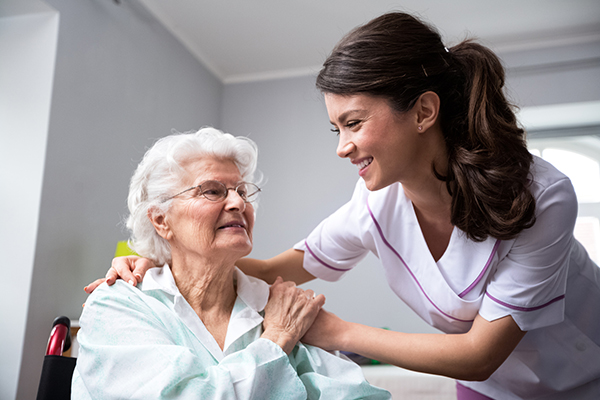Inviting a new caregiver into the home can be a daunting event. After all, the senior will rely on someone whom, at first, they do not know. Over time and through building rapport, the relationship can be rewarding for both the care recipient and caregiver. Developing a relationship of mutual understanding is beneficial for all involved.
Requiring home care services suggests that physical illness, cognitive impairment, or disability has occurred. Scenarios like these are stressful enough. Consequently, patience is often tested and tempers are bound to flare in moments of distress and as a new caregiver becomes accustomed to the needs of their new care recipient.
In order to promote healing in the senior, a friendly bond should exist between the caregiver and care recipient. Quality care is a valuable outcome of a professional, genial relationship. Here are a few ways you can develop a positive comradeship with a caregiver.
1. Communicate
Trust is built over time as the care recipient asks for help and the caregiver delivers. Seniors learn that they can depend on their caregivers to be there when they most need help. In fact, the whole caregiver/care recipient relationship is based on providing and accepting assistance.
Just as elderly care recipients must learn to ask for help, caregivers must ask questions in order to fully understand the needs and wants of the seniors in their care. When seniors are unable to verbalize needs, family members should step in to make care recipients’ wishes known.
Communication is a two-way street. Both parties involved in the caregiving process should engage in transparent communication to develop trust. Communications between family members, home care agencies, the caregiver and senior are essential during collaborative efforts to improve the lives of vulnerable care recipients.
2. Respect Privacy
While communication is critical to building a relationship, not all details have to be shared in order to receive or provide care. Family matters are likely to be private and do not need to be discussed with a caregiver. Honest caregivers respect the privacy of their care recipients.
Likewise, a caregiver’s privacy should be respected. Curious seniors may unwittingly probe into the personal lives of their caregivers, which could cause discomfort in the professional. To promote a positive relationship, both caregiver and care recipient should take care to avoid crossing boundaries.
3. Share Appropriately
While an individual’s personal life should remain private, appropriately sharing leads to a more satisfying bond between caregiver and care recipient. Elderly folks can still learn about the person to whom they are entrusting their care by discussing general topics.
Conversation starting points may include asking where the caregiver is from, what is their professional history, and why did they choose to go into the care profession. Seniors may also initiate discussions about their and the caregivers’ hobbies and favorite books, movies, or restaurants.
Talking about mutual interests, like golf, crocheting or the latest in horse racing, can open the doors to great conversations, and allow both parties to look forward to the next visits, where more brilliant discussions can take place. What builds is a cheery, professional association.
4. Clarify Expectations
When caregiver expectations are clear, providing care is easier and contributes to a more positive caregiver/care recipient relationship. Family members should outline their expectations in writing. All those involved, including the home care agency, should be aware of the senior’s care requirements.
Establishing clear expectations allows caregivers to understand what is required of them. Misunderstandings fail to interfere in the relationship and a good deal of trust is built. Plus, the professional experiences increased job satisfaction when she is able to fulfill her responsibilities.
5. Reinforce the Positive
All too often, caregivers hear about errors. Seniors who praise their caregivers for acts of compassion or undivided attention show their appreciation and recognition of a job well done. Commendations only reinforce positive behavior and go a long way to help sustain a meaningful relationship.
6. Engage
Perhaps a senior finds comfort in reading, but is unable to due to poor vision. Involve the caregiver in activities enjoyed by the senior to significantly build the relationship. Ask the caregiver to read to the senior, participate in crossword puzzles or similar pastimes to decrease stress and increase joy.
Active listening is another way to engage and develop the relationship. The elderly individual is likely to have a treasure trove of stories to tell, and a caregiver could be a captive audience. Rapport is built when the care recipient makes efforts to be heard and the caregiver listens.
7. Choose Judiciously
The most influencing factor in developing the caregiver/care recipient relationship is choosing the right caregiver in the first place. During interviews, closely examine the interactions between the senior and potential caregiver. If instant rapport is built, the camaraderie is likely to continue.
No matter how sincere the bond is between the caregiver and senior, the association is professional. Caregivers are in the lives of their care recipients to perform a job. The exchange of pleasantries, however, goes a long way in helping caregivers perform at their best and care recipients receive quality care.
Working with a Home Care Agency
Families are one step closer to ensuring their senior loved ones are well cared for when they turn to Assisting Hands Home Care. As a premier senior care agency, we are positioned to provide comprehensive care services to the elder population.
Our full range of non-medical senior care services include assistance with grooming, bathing, and transportation. Professional caregivers also reduce isolation and loneliness via companion care activities. Our team of caregivers also stimulate the minds and bodies of the elderly through meaningful conversations, memory games and leisurely walks.
Families in Fort Myers, Florida, and the surrounding communities rely on Assisting Hands Home Care for compassionate . Our professional caregivers are dedicated to helping the elderly population live with dignity and as much independence as possible. Contact an Assisting Hands Home Care representative to get your elderly loved one started on the path to wellness and dignity.
Get a Free Consultation
To get a free consultation with one of our staff members to discuss your loved one’s needs and how we can help, give us a call at (239) 221-6326.



